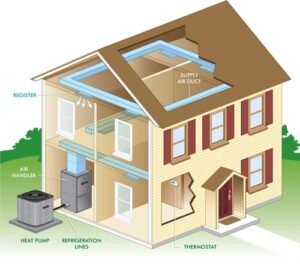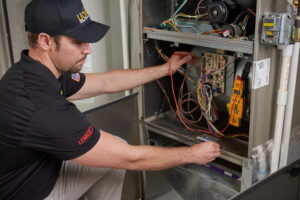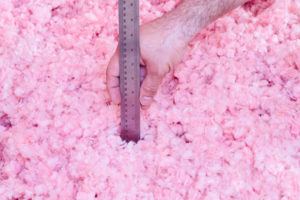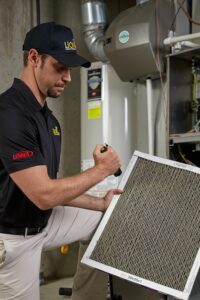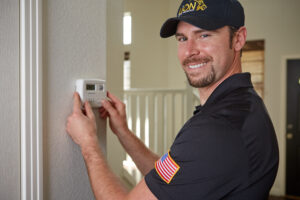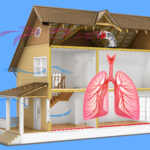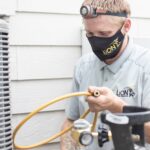Whether it’s a cold winter morning or a hot summer afternoon in Northern Colorado, your HVAC system is working hard to keep you comfortable.
There is a lot of well-intentioned and good advice out there on the internet, along with a lot of misleading myths that can end up costing you time and money. Fortunately, Lion Home Service is familiar with all of the most common HVAC myths, and we have the facts to debunk them.
Myth #1: Crank up the T-Stat
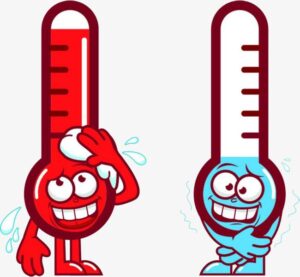
Myth #2: Close those vents and registers
Truth: This myth makes sense in theory—if you’re not using a room in your home, why not close the vents so you won’t have to pay for heating or cooling an empty room? However, closing vents can actually cost you more money in the long run by damaging vital components of your HVAC system. Even if your vents are closed, air is still circulating through your ducts. This increase in pressure can damage your ductwork, and damage your blower fan by causing it to leak or overwork. Bottom line, it’s best to leave all of the vents in your home open so that air can circulate throughout your home properly. If you have hot and cold spots in your home, talk to one of our experts about zoning and duct sealing.
Myth #3: Fixing an old furnace repeatedly
Truth: Maintenance matters! Just as you schedule routine maintenance for your car, and annual checkups for you and your family, your HVAC system needs an annual check-up as well. While it may be tempting to skip a routine maintenance appointment to save some money, this decision can have negative financial impacts in the long run. This is due to the fact that routine maintenance gives a service expert the opportunity to spot and fix small problems before they become more serious, and more expensive.
Having your system assessed annually can save you from costly repairs down the road or worse. The systems fatigue will trigger damages in the furnace’s firebox, which increases the chance of carbon monoxide poisoning.
Myth #4 High Efficiency system solves all
Truth: It takes a combination of various insulations, such as sealing your doors, windows, attic space, plumbing pipes, duct work and any leaks and cracks, Together, with the air produced by your efficient system will in and keep you comfortable and save money.
Myth #5: The larger the system, the better
Truth: Bigger can actually be worse. The size, or power, of a system is carefully measured to properly heat and cool your home. A more powerful system can occasionally be fine, but most often ends up short-cycling (shutting off and on prematurely), which can cause long-term damage to the system, costing you more money to operate and shortening its lifespan.
Be careful when choosing the contractor because some will convince homeowners to make a bigger purchase than necessary and pay for power you don’t need. When it is time for you to replace your HVAC system a Lion Expert will measure your home and offer you a system with the exact specifications you need to ensure you receive the most energy efficient system available.
Myth #6: Only changing filter once a year
Truth: Your filters are your home’s first line of defense against all the dirt, dust, and other contaminants that can circulate throughout your HVAC system. Because of this, it’s important to change your filters much more often than once a year. Dirty filters can constrict the amount of air that flows through the system, causing the system to work harder—which can lead to a possible breakdown. Dirty filters can also have an overall negative effect on the air quality in your home.
Ideally, you should clean or replace your filters every six weeks. If anyone in your home has asthma, allergies, or other respiratory conditions, you should change your filters monthly. This also holds true if you have pets, as their hair and dander can contribute to your filters getting dirty faster.
Take advantage of our Filter Subscription program and have filters delivered conveniently to your home.
Myth #7: Keep the temperature the same
Truth: If you’re not at home, you can save money by raising or lower the temperature on the thermostat. Rather than remembering to do this before you head out the door in the mornings, you can set a programmable thermostat to do it for you. For example, if you’re home in the mornings, but away at work during the day, you can program the thermostat to automatically increase or decrease the temperature as needed. According to the EPA, homeowners can save around $180 a year by using a programmable thermostat.
Myth #8: Using you HVAC system in short bursts saves money
Truth: Your HVAC unit actually uses the most energy during the first 3-5 minutes after you switch it on. If you continuously turn your unit on and off, you’ll end up using a lot more energy than necessary, which will be reflected in higher energy bills.
To heat or cool your home more efficiently, try toggling the switch on your HVAC unit to “on” and then leave the system to run uninterrupted. This allows the fan to blow air constantly, helping to maintain the temperature in your home and reducing the amount of energy that’s used.
Myth #9: If its not broke, don’t fix it
Truth: If you’ve been holding out on replacing your HVAC system, it’s time to see how technology has changed. When it comes to comparing older and newer HVAC systems, the differences are clear. Newer systems are exceptionally energy-efficient, allowing you to save on your monthly energy bills. Newer systems are also generally quieter, easier to operate, and less prone to breakdowns. Additionally, older systems may use defunct parts or equipment, such as R-22 refrigerant, which can make repairs costly. Rather than continuing to pay for a system that’s past its prime, replacing the system altogether is a better investment overall.
If you need help with Furnace or Air Conditioner maintenance or repair, We serve For Collins, Loveland, Greeley, Longmont, Boulder, Windsor and the surrounding areas. Contact us today to schedule an appointment with an expert you can trust. [phonenum]


